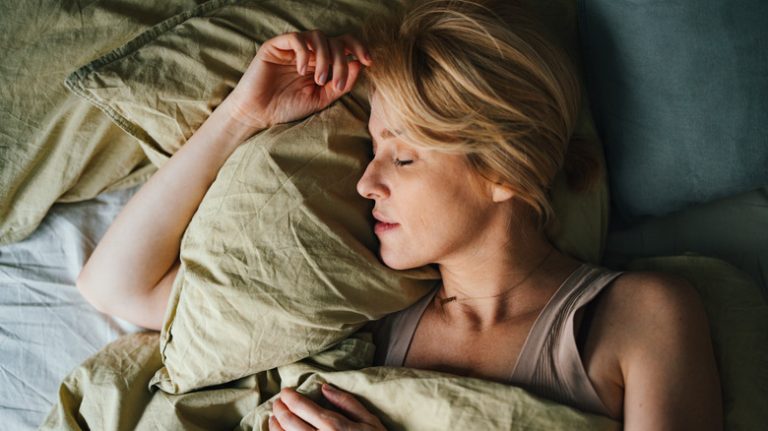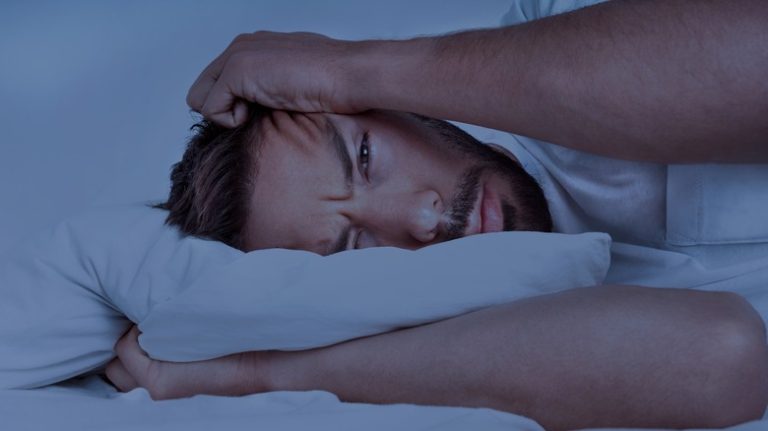While we try to find time for work, family, friends, exercise, and our favorite hobbies, we can easily get so busy that we miss out on another crucial aspect of life: sleep. And yet one source of comfort during the busiest of seasons is sleep.
Sleep helps our bodies and minds recover and it’s necessary for good health, as the American Journal of Respiratory and Critical Care Medicine highlighted. According to the Centers for Disease Control and Prevention, adults who get less than seven hours of sleep per night are more likely to report chronic illnesses like kidney disease, coronary heart disease, diabetes, arthritis, depression, and even cancer.
Because of the direct connection between sleep and our health, it is important for us to look at the sleep habits we have. These habits can help us understand ourselves more closely and reveal a lot about our mental and physical health.
A lack of sleep could be hurting your mental health

We know that our bodies need sleep for physical recovery, but we can sometimes forget that our mental health relies heavily on healthy sleeping habits. This relationship between sleep and mental health is a vicious cycle, as people with mental health disorders often have sleep issues and those with sleep issues are more likely to have mental health disorders (via UT Southwestern Medical Center).
How does sleep affect our mental health? One of the ways is through our REM cycle, the period of sleep that aids in our memory and cognitive function, as well as our emotional well-being. Like many sleep-related topics, more research is needed. Nevertheless, experts recognize that sleep disruption actually affects our neurotransmitters and stress levels throughout the night (via Cleveland Clinic). As the National Sleep Foundation explained, researchers have found that “brain activity during sleep has profound effects on emotional and mental health. Sufficient sleep, especially REM sleep, facilitates the brain’s processing of emotional information.”
A 2024 study published by the Frontiers in Neurology confirmed that insomnia is a major public health problem. It has been proven to increase cases of generalized anxiety and panic disorder, post-traumatic stress disorder, and phobias. For those who have these types of disorders, sleeping habits are especially important to consider.
Can’t sleep? Blame blue light

Catching up on your favorite Netflix show before bed may be a comforting nightly habit, but your TV, computer, or phone screen could be keeping you from getting a full night’s sleep. Take a second and think about how life was before we had technology at our fingertips. Humans would slowly settle in as the sun went down because we didn’t have artificial light keeping us awake. We were guided by the light of candles and our sleeping patterns followed the light of day. Now with so much artificial blue light, our bodies have a harder time following a rhythm (via Sleep.org).
But what is blue light? According to Harvard Health, blue light is made up of the blue wavelengths that come from electronics and energy-saving lighting. It’s actually beneficial to us during the day because it can boost our mood and give us energy, but it keeps us awake at night. One of the reasons blue light affects our sleep is because of melatonin. Melatonin affects our body’s internal clock, or circadian rhythm, and when we are exposed to light at night, our melatonin levels decrease.
If you have a habit of exposing yourself to a lot of blue light before bed, it may be a good idea to switch up your routine. Harvard Health suggests avoiding blue light within two or three hours before bed, or wearing blue light glasses if you work any type of night shift.
Loss of memory and creativity could mean you need more sleep
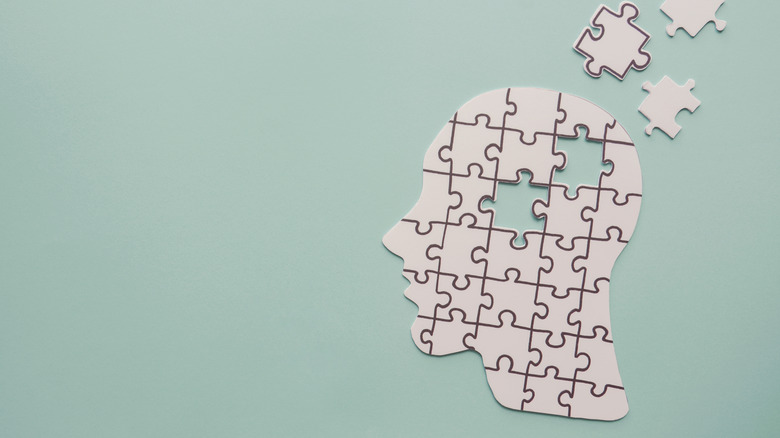
Shutterstock
If you’re experiencing brain fog, memory loss, or a lack of creativity, your sleeping habits could actually be to blame. According to a research study on the neuroprotective aspects of sleep, our bodies need at least seven hours of sleep for healthy cognitive function, memory retention, and behavioral awareness. If you fail to get proper sleep, your cognitive abilities can take a hit, and in multiple ways.
This research study also looked at sleep and its impact on mental fatigue, which is directly related to not only memory but creativity as well. This is said to have both short-term and long-term effects on our brains and cognition.
Additionally, according to a study on temporal memory and sleep published in the Journal of Experimental Psychology, sleep deprivation leads to poor memory and impaired cognitive performance. This is still the case even when higher levels of caffeine were added to the study as an attempt to compensate for the loss of sleep. If you are experiencing any sort of memory loss or feel a change in your cognitive performance, this could be pointing you to more sleep.
Eating a large meal late at night can impact your sleep
Shutterstock
Some people enjoy a large, comforting meal for dinner. However, according to a 2024 review in Nutrients, eating larger meals before bed may slow our metabolism and lead to weight gain. That said, the journal also suggests that later research has shown that small, nutrient-dense meals before bed can actually have positive impacts on our physical health and weight maintenance. Even though the research on this is divided, it is largely agreed upon that having a big dinner before bed can disrupt our sleep patterns.
According to the Sleep Foundation, overeating before bed can wreak havoc on sleep because the body is working to digest food in the middle of the night. If you overeat at night, you may also experience discomfort or heartburn — and this can lead to poor sleep quality. This is especially true if you have gastroesophageal reflux disease (GERD), as a 2024 study in the Journal of Neurogastroenterology and Motility confirmed.
Is Wi-Fi messing with your sleep?

Shutterstock
In addition to the blue light they emit, electronics can impact your sleep in another way. You can easily find low-frequency electromagnetic fields (EMFs) in your home (think: Wi-Fi routers and microwaves). Although more research still needs to be done, EMFs may negatively impact your sleep. According to a study published in Scientific Reports, the neurons in our central nervous system are the most sensitive to EMFs, and the neurological impact of these magnetic wavelengths can include loss of sleep and impaired memory.
However, Healthline explained that “EMFs are unlikely to cause any adverse health effects.” The site continued, “Instead of worrying about EMFs, you should simply be aware of them and reduce exposure.” If you’re struggling to get quality sleep and think EMFs could be contributing, you can try unplugging your Wi-Fi router at night or sleeping with your phone in another room.
If you’re tossing and turning at night, you might need more exercise in the day

Shutterstock
Some nights you fall into a deep slumber as soon as your head touches the pillow. But then there are those pesky nights in which you lie awake in bed, eyes wide open, confused as to why you can’t seem to fall asleep. If this is happening to you often, your daily movement — or lack thereof — may be the culprit. Research has found a correlation between exercise or physical movement and sleep quality.
A 2024 review published in Advances in Preventive Medicine reviewed 34 separate studies on the relationship between exercise and sleep. Out of the studies reviewed, 29 showed that exercising led to higher sleep quality. Although four studies reported little to no effect on sleep and one reported a negative impact, the numbers still reflect a positive relationship between movement and sleep.
Dr. Michelle Drerup, sleep medicine psychologist, said you don’t need to do high-intensity workouts to ensure sleep, and that even light activity can increase sleep drive. “Even doing things like chores or short walks, can increase your sleep drive, Drerup told the Cleveland Clinic. This is important to remember, especially if you’ve started to work from home. You may not be as active as you once were, which may be affecting your sleep. If this resonates with you, a nice walk or quick yoga session could help you get a good night’s rest.
Skipping sleep could lead to weight gain
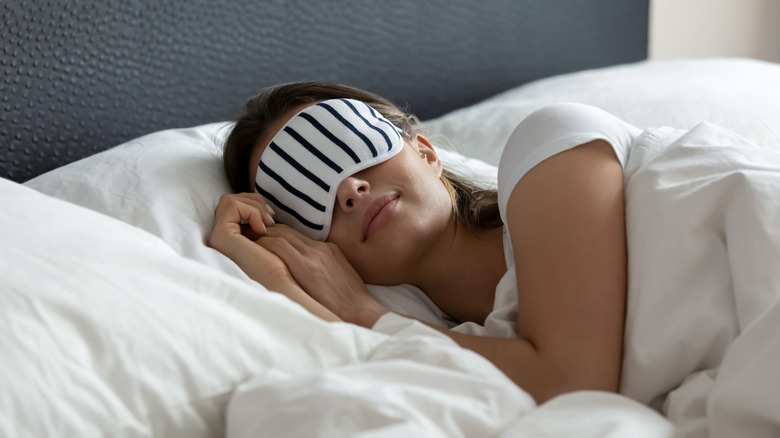
Shutterstock
Have you ever had trouble losing weight or maintaining your weight, even after changing up your diet and fitness routines? For some, this could possibly point to a lack of consistently good sleep. There are a few different factors that play into how your sleeping habits can affect your weight management. For one, sleep has been shown to directly impact metabolism, as a review in Current Opinion in Clinical Nutrition & Metabolic Care explained. When you lose sleep, your metabolism actually slows down and your tolerance of glucose decreases. This can cause weight gain.
Aside from regulating our metabolism, we also need sleep for hunger regulation and physical recovery. Registered dietitian Katherine Zeratsky explained that the quantity and quality of our sleep seem to affect the hormones in our body that regulate our hunger levels (via Mayo Clinic). These hormones are called leptin and ghrelin. Zeratsky also highlighted the idea that when we lose sleep, we become more tired and lethargic throughout the day. This could lead to a lack of desire to exercise and move our bodies.
Working the night shift may mess with your inner clock

Shutterstock
Working any sort of night shift job can directly impact your body’s natural rhythm, the circadian rhythm. And when your circadian rhythm is off, your sleep is negatively impacted.
To understand this a bit more, let’s first look at what a circadian rhythm really is. Basically, it’s a 24-hour sleep-wake cycle, and all living organisms follow some form of a circadian rhythm, as an article in Endocrine Reviews explained. When we are in line with our circadian rhythm, our bodies are able to get the most rest. As human beings our circadian rhythm, or inner clock, can be altered greatly by artificial light and jobs that require night shift work.
According to Endocrine Reviews, people who work consistent daytime shifts have been known to have more stable metabolisms than those who work night shifts. This was found to be true even when diet was similar in those working both types of shifts. Because of the research implications on the importance of our circadian rhythm, it may be helpful to note whether or not we are implementing consistency in our sleep.
Working from your bedroom may make it hard for you to get adequate rest
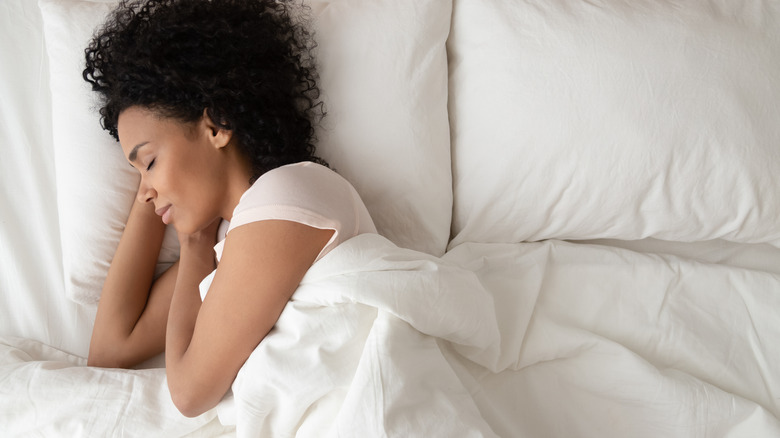
Shutterstock
When working from home, you may be tempted to use your bed as a desk. But when we use our beds for things other than sleep, it can actually negatively affect our quality of sleep. Some people take this a step further and say that activities other than “sleep and sex” should be prohibited from your bedroom in order to get a good night’s rest.
But why is this so important? Well, a large part of it is mental “Keeping computers, TVs, and work materials out of the room will strengthen the mental association between your bedroom and sleep,” according to the Division of Sleep Medicine at Harvard Medical School. And as the “HBR Guide to Being More Productive” explained, this boundary is crucial for maintaining a sense of relaxation and comfort in your sleeping space. Without this space, you may struggle to get the sleep you need.
Nocturia could be disrupting your zzz’s
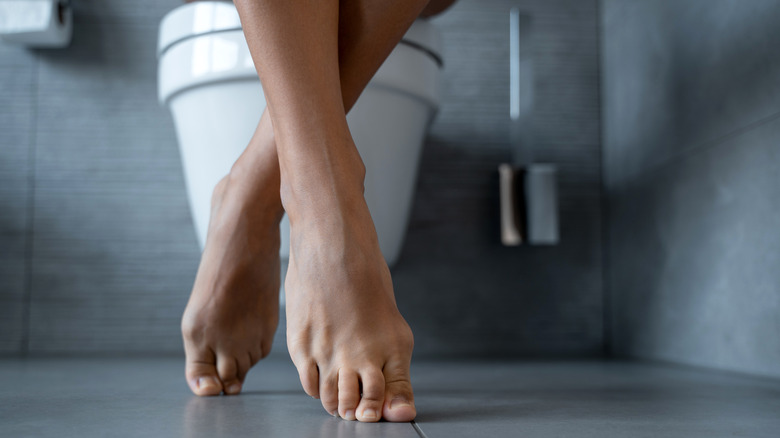
Shutterstock
Waking up to pee in the middle of the night is inconvenient, sure, but it may also be a sign of something more serious. If you find yourself having to race off to the bathroom during the night, you could have something called nocturia. Nocturia is “a condition characterized by the need to awaken [one or more] times per night to void,” according to a report in Reviews in Urology. It may sound intimidating, but it is actually very common.
It can be caused by an “overproduction of urine.” On average, people produce less than a third of their daily urine at night. If someone is peeing one or more times throughout the night, however, their kidneys may be producing more urine than their bladder can hold. Because it’s so normal to have to pee in the middle of the night, nocturia on its own is not necessarily a cause for concern. The main reason someone would need to seek medical attention is for the sleep disruption it can cause. Aside from lowering a person’s day-to-day energy levels, nocturia can also negatively affect someone’s quality of life.
Maintaining a consistent sleep schedule can improve your overall health

Shutterstock
With the busyness of everyday life, it may be tempting to put a consistent sleep schedule on the back burner. Even though it may seem difficult to go to bed at the same time every night, research has proven that it can help your sleep quality and overall health.
A Taiwanese study published in BMC Public Health found that undergraduate students who had irregular sleep schedules reported having lower sleep quality overall. The irregularities not only led to lower quality but less sleep in general. A consistent sleep schedule may not seem that important, but this study revealed that a change as small as a two-hour difference in sleep schedules can alter our cognitive performance and psychological abilities.
Dr. Lawrence J. Epstein of Harvard recommends a consistent “sleep-wake” schedule in order to make sure you’re getting healthy levels of sleep. He suggests taking a look at your current nighttime routine to see which variables may be getting in the way of maintaining consistency. These barriers of consistency are unique to each individual, so it’s important to ask yourself what you need to make your own sleep schedule.
There are multiple reasons you could be waking up throughout the night
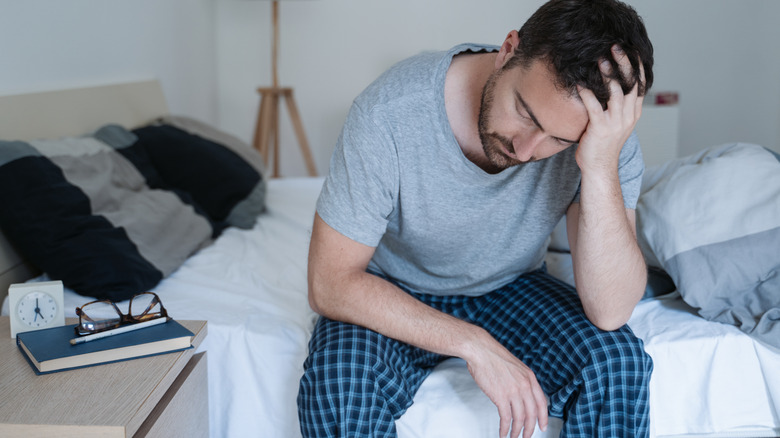
Shutterstock
If you’re finding yourself waking up in the middle of the night on a consistent basis, it could mean a few different things.
For one, anxiety and depression can negatively impact our sleeping patterns. According to the Wexner Medical Center at Ohio State University, anxiety can cause different forms of insomnia. Sleep-onset insomnia is characterized by being unable to fall asleep, and sleep-maintenance insomnia involves waking up in the middle of the night and having a hard time falling asleep. It’s also mentioned that some people living with depression have reported cases of terminal insomnia, or waking up before your alarm and being unable to fall back asleep.
Sleep apnea is also a common cause of waking up in the middle of the night. This occurs when the airflow is blocked from the lungs while someone is sleeping, and when the brain’s breathing signals are altered. Other common causes of waking up in the middle of the night include indigestion or other stomach disturbances, overheating, and night terrors (via Medical News Today).
If you’re not sleeping well, stress could be to blame
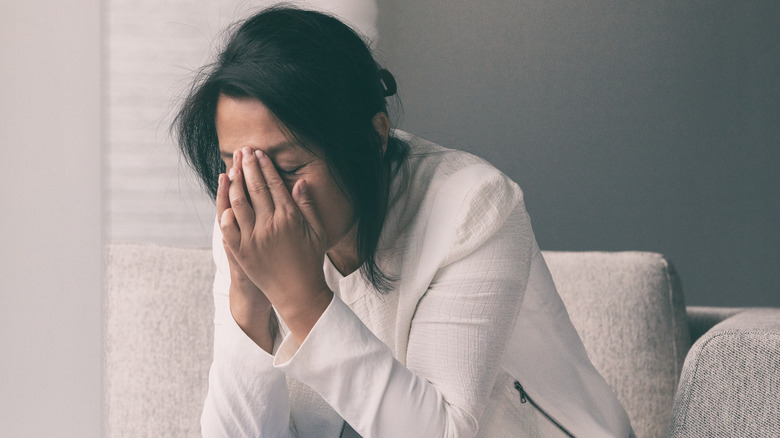
Shutterstock
Stress is difficult to avoid in its entirety, as things like work, family, and finances come into play. But if stress isn’t managed, it may have a lasting effect on sleep health.
According to a review in the Scandinavian Journal of Work, Environment, and Health, stress can cause shortened sleep, irregularities, fatigue, and difficulty reaching REM sleep. Because of the negative effects that stress can have on sleep, it’s also possible that these consequences will in turn make the stress itself even worse than before.
Stress is hard on the body in multiple ways. For one, the Journal of Experimental Neurology states that stress interferes with the body’s central nervous system. This creates psychological and physiological issues and can lead to short-term insomnia. This short-term insomnia usually only lasts a few days or a few weeks, or for the duration of the stress. Another type of insomnia is physiological insomnia, which is different from short-term in that it’s chronic. Although there have been hypotheses made about the relationship between stress and chronic insomnia, more research still needs to be done.
Talking in your sleep can point to other health concerns
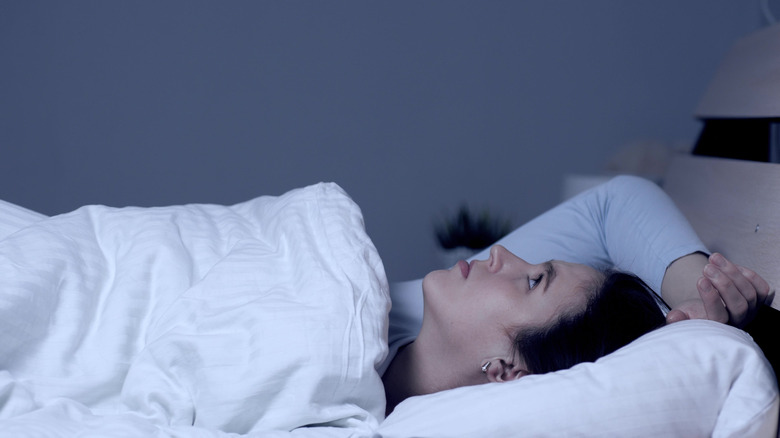
Shutterstock
Have you ever wondered what your sleep talking means? Talking in your sleep is known as a type of parasomnia, which just means an unusual behavior while someone is sleeping. Although sleep talking itself is harmless, it might be able to point us to certain clues about our health.
Sleep talking is caused by a number of things, including stress, alcohol, sleep apnea, REM sleep behavior disorder, or post-traumatic stress disorder (via Cleveland Clinic). It can also be a product of certain mental health disorders, such as anxiety or depression. Because sleep talking is associated with disrupted sleep and insomnia, it can sometimes be lessened with habits like a consistent sleep schedule, plenty of movement throughout the day, limited alcohol and drug consumption, and at least seven hours of sleep per night. Plus, even if you don’t have this parasomnia, practicing healthy sleep hygiene is beneficial.
